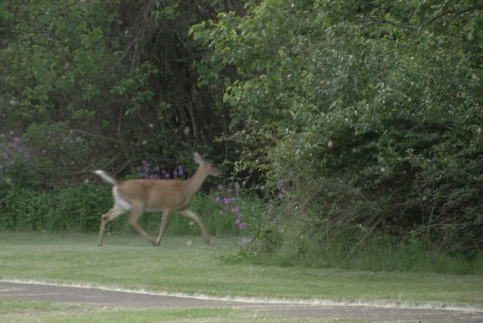2nd Case of Chronic Wasting Disease Found in Meridian Township
- Published: 7/14/2015
- Comments
- Updated: 7/20/2015
UPDATE:
MERIDIAN TOWNSHIP - The Michigan Department of Natural Resources and the United State's Department of Agriculture's National Veterinary Services Laboratory in Ames, Iowa has confirmed that a second deer has tested positive for Chronic Wasting Disease (CWD) in Meridian Township.
The two-year-old buck was taken within one mile of the first deer that tested positive. The DNR and USDA will perform DNA testing to determine if there is a relationship between the two deer. And while Steve Schmitt, Wildlife Veterinarian for the DNR, expressed disappointment over finding the second deer, he said it wasn't a surprise.
"When we found that positive deer in may, We expected to find more," Schmitt said. "We didn't think that was the only CWD positive deer that was out there."
And in Meridian Township, the culling continues with the help of the DNR and USDA. The culling is being handled by trained sharpshooters, and only takes place after the parks have closed at dusk.
"Residents should be aware that this is continuing, and this is a long-term issue," Greg Frenger, Meridian Township Police Lieutenant said.
Chronic Wasting Disease is a neurological disease that affects deer, elk and moose. Signs of the disease include the deer losing its fear of humans or other abnormal behavior, or is unusually thin. The disease is ultimately fatal. While there is no known risk to humans, the DNR says testing will continue.
"We've tested hundreds of deer so far, roadkills and some taken by USDA Wildlife services, but their plan calls for testing thousands of deer, and most of those will come from hunter harvested animals this fall," Schmitt said.
And he also said the fact that the second deer was found within a mile of the first is a positive sign.
"It's better to find a small area where you have the disease than a large area," Schmitt said.
ORIGINAL STORY:
MERIDIAN TOWNSHIP - The Michigan Department of Natural Resources and the U.S. Department of Agriculture continue to cull deer in Meridian Township to test them for Chronic Wasting Disease.
DNR Wildlife Veterinarian Dan O'Brien says the total number of deer tested for CWD is 191 as of the end of last week. The deer tested have been from nine townships, including Meridian. So far there have been no deer that have tested positive for the disease since the initial deer was discovered with CWD. But O'Brien says he's not sure that trend will continue.
"We would like to not have any more positives, but, quite honestly, the probability is at some point we will," O'Brien said. "We just have to do the testing to find out. That's part of the process."
O'Brien also says that some doe have been culled, but it is still mostly bucks that are being captured.
While there are no known risks to humans involving Chronic Wasting Disease, the DNR's emergency order is still in effect. There is a deer and elk feeding ban, and all deer caught during hunting season must be tested for the disease. In addition, all roadkill deer will be tested for CWD, and salvage of roadkill deer is prohibited.
Symptoms of CWD can include a deer looking unusually thin or behaving abnormally (not showing fear of humans, wandering around in circles, etc.). If you see a deer that looks suspicious, you are encouraged to call the DNR Wildlife Disease Lab at 517-336-5030. You can also file a report with the DNR online or call 9-1-1.
The DNR says the disease is spread through bodily fluids such as saliva and blood, so if you see a roadkill deer, you are encouraged to report it as soon as possible to prevent contamination of the surrounding environment.


 Spanish
Spanish Chinese (Simplified)
Chinese (Simplified) Korean
Korean French
French German
German Hindi
Hindi Urdu
Urdu Japenese
Japenese Arabic
Arabic Russian
Russian Farsi
Farsi
